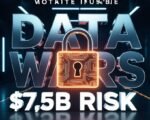Retailers across Europe are turning to artificial intelligence to combat rising theft, with AI-powered surveillance emerging as a crucial tool in preventing losses. Paris-based start-up Veesion is leading the charge, using machine-learning algorithms and biometric analysis to detect shoplifters in real-time.
AI Watches While You Shop
CCTV cameras have long been a fixture in retail stores, but AI is changing how they function. Instead of passively recording, Veesion’s software actively scans live footage, identifying suspicious behaviors such as concealing items in pockets or bags. The system then alerts store employees, allowing them to intervene before the theft occurs.
Hamza Saleem, a senior account executive at Veesion, explains that the technology continuously improves by learning from vast datasets. “We analyze thousands of hours of footage to refine our detection capabilities. The AI doesn’t just recognize specific faces—it understands movements and behaviors that indicate potential theft.”
A Growing Market for AI Theft Prevention
Retail theft has surged in recent years, costing businesses billions annually. Traditional security measures, such as security tags and human surveillance, are proving insufficient. AI-powered solutions are filling the gap, offering a scalable and efficient alternative.

According to Veesion, its software has been deployed in over 4,000 stores across 25 countries, reducing shoplifting incidents by up to 60%. Retailers see the system as a game-changer, particularly for small and medium-sized businesses that lack the resources for dedicated security teams.
- AI detection allows for real-time alerts, reducing reliance on store personnel.
- Unlike facial recognition software, biometric movement analysis does not require a database of known offenders.
- Installation is seamless, integrating with existing CCTV infrastructure.
Beyond Shoplifting: Expanding AI’s Role in Retail
The potential applications for AI in retail extend beyond theft prevention. AI-driven analytics can also track customer behavior, optimizing store layouts and marketing strategies. By understanding how shoppers move through a store, businesses can improve product placements and enhance the shopping experience.
Security concerns, however, remain a critical issue. Privacy advocates worry about the implications of AI surveillance, particularly regarding data collection and potential misuse. Veesion emphasizes that its technology does not store personal data, focusing solely on behavioral analysis.
A Tech-Driven Future for Retail
As AI surveillance gains traction, its impact on the retail sector is undeniable. With theft on the rise, businesses are investing in smarter security solutions to protect their bottom line. While ethical debates continue, AI-driven theft prevention appears set to become a standard fixture in stores worldwide.








